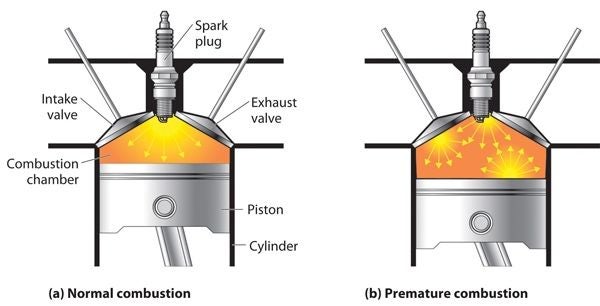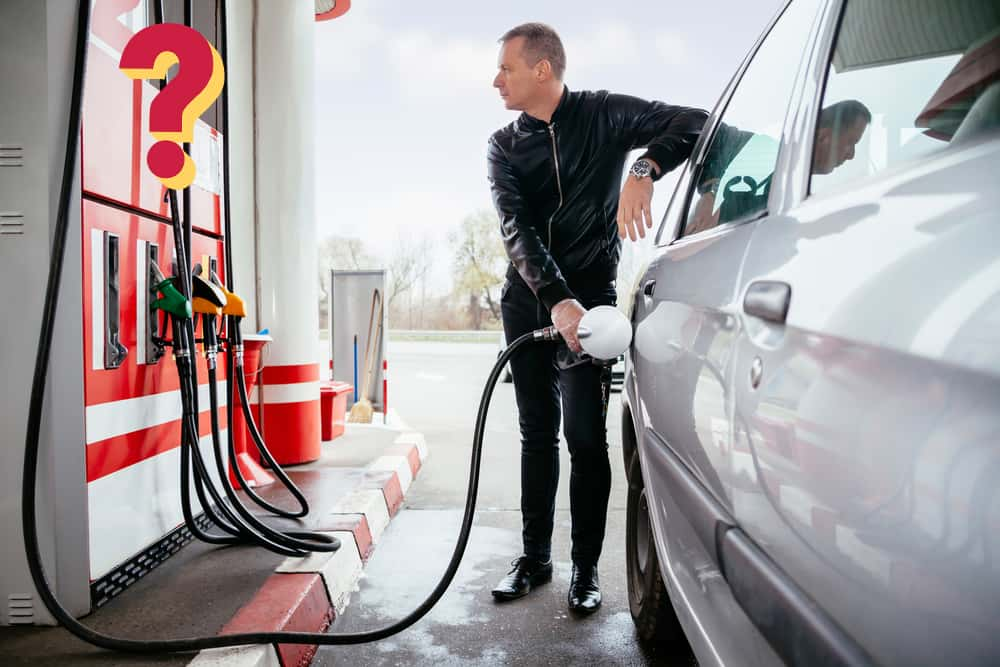Xtra Premium, Speed, Power, 93 Octane, Speed 97, you have probably heard all these names on your daily trips to the petrol pump. Some of you might pick normal petrol over these because you feel that these are just fancy names for the same and have no real benefits. The rest of you probably regularly use these because you believe that there are positive effects arising from the use of premium fuels that justify their cost. So which one of these contrasting perceptions is correct? In this article, we will find out the truth behind the
octane numberand
premium fuels. Let's assess if they are actually useful for your car.
Engine Knocking Explained:
First, we need to understand the problem for why you need fuels with different octane ratings. Inside the engine, it is always desirable that the fuel burns uniformly and the flame spreads evenly from the top to the bottom. In high-performance engines, the operating conditions are much more extreme compared to a normal engine. They deal with higher temperatures, higher pressure and higher RPM to name a few. So in such conditions, the case may often occur where the fuel prematurely ignites even before the flame reaches there due to the operating conditions inside. This reaction is often very violent and causes a series of mini explosions inside the combustion chamber. These explosions are heard as knocking or pinging sounds from the engine and hence this process is termed as engine knock.

A prolonged occurrence of engine knocking can cause serious damage to the engine’s inner parts. The piston head, valve head and cylinder sleeve are directly exposed to these explosions and will experience the most damage due to knocking. Indirect damage can reach parts like the crankshaft and manifolds as well.
What is Octane Number and what does it do?
An important misconception that a lot of people have is that the Octane Number denotes the percentage of octane molecules present in a particular fuel. This is wrong as the Octane Number is only a representative figure of the fuel’s tendency to burn without detonating. As the Octane Number increases, the detonating tendency of the fuel decreases. The Octane Number affects the activation energy of the fuel. In simple terms, an increase in the octane number will make the fuel require a higher amount of energy before it starts to combust. So even if the side conditions like pressure, temperature are higher, the increased activation energy will make sure that the fuel will only catch fire because of the spark plug and not because of the surrounding conditions.
What are the Octane Numbers of Fuels in India?
In India, the minimum octane rating for fuels as prescribed by Government through Bharat 3 emission norms is 91 Octane. The normal unleaded fuel sold through any company in any city has an octane rating of 91. The premium fuels like Extra-Premium, Speed and Power also have the same octane rating of 91. They, however, do consist of extra additives and detergents that clean the insides of the engine and prevent sludge formation on prolonged usage. As such there are only two types of fuels in India with a higher Octane rating than 91 namely, 93 Octane from Indian Oil and Speed 97 from Bharat Petroleum. Both are however only available in limited outlets across a few metro cities.
Are premium fuels worth it?
This is mostly a subjective question. While we certainly can say that premium fuels have their benefits and are not marketing gimmicks, their usefulness is tad necessity-based. The only exception is in the case if you own a premium sedan or a performance oriented car which specifically demands a minimum octane rating of 93 or above. In such cases, it is absolutely necessary to hunt for that petrol pump which serves the same or use octane booster additives. In any other car, normal fuel will run just fine without suffering from engine knock. Ideally, if your car’s engine has a compression ratio (usually mentioned in the owner’s manual) of less than 11:1 it will run fine on normal petrol.

Coming to the topic of premium fuels with the same octane rating of 91, they do help a little. The detergents are actually effective in keeping the insides of the engine clean. This will certainly ensure smoother and better operation of the engine in the long run but not to the extent that fuel corporations might say in their ads. Even that difference to most people, might not be very noticeable. Unless you are a hardcore car enthusiast and care about the really intricate details, you will be very much happy using normal petrol on a regular basis. The government keeps revising their standards and have currently set the minimum octane rating as 91 to ensure that it’s suitable for the majority. So, normal fuel will do just fine for your car as long as the required octane rating matches. You will, however, notice an increase in smoothness of operation if you increase the octane rating. Not a bad idea to give it a shot once a while.






.jpg&w=828&q=75)






.jpg&w=828&q=75)
.jpg&w=828&q=75)
.jpg&w=828&q=75)
.jpg&w=828&q=75)

.jpg&w=384&q=75)

.jpg&w=384&q=75)
.jpg&w=384&q=75)

.jpg&w=384&q=75)
.jpg&w=384&q=75)

.webp&w=384&q=75)








